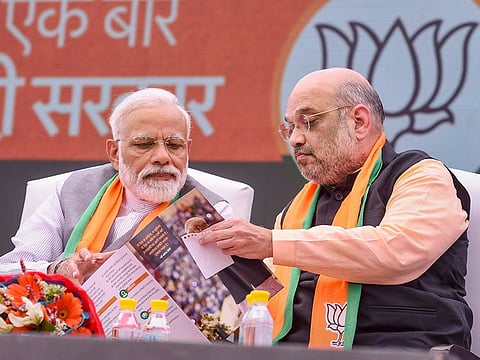How Narendra Modi towers over other political leaders
Indian democracy’s incredible strength, weakness lies in the ticket distribution process

In the classic Hindi film Aandhi made by Gulzar, there was a strong character — Lallu Lal played superbly by actor Om Prakash. He was political adviser-cum-campaign manager of Aarti Devi, heroine of the film. The film was supposedly based on Indira Gandhi.
In India, the likes of Lallu Lal are inevitable and play important roles for real-life political leaders. They are politically razor sharp. They know the socio-political character of constituencies, local issues and current mood of the voters, strengths and weaknesses and public images of political aspirants (ticket-seekers from political parties to fight election). They operate within the party or sometimes with the top leadership.
Prime Minister Narendra Modi and Home Minister Amit Shah have one thing in common. Both are successfully synchronising the decision-making process in selecting the right candidates for the right constituencies.
They synchronised Keshubhai Patel, L K Advani and Atal Bihari Vajapeyee’s election campaigning in Gujarat before becoming national leaders. In Indian elections every serious candidate needs his or her own Lallu Lals.
Who can win the seat is the sole criteria for all the political parties but Modi has a better success rate in this political act
In India it is often a highly complex process of selecting the right candidate for the right constituency because caste, religion, economy, development and many other issues play a part in the win or defeat of a candidate.
The Indian opposition is frustrated now to see how the initial negative perception of the Modi government due to Covid mismanagement is ebbing from public memory as India has achieved the difficult task of administrating a billion anti-Covid vaccines despite the weak status of its health infrastructure.
Advantage BJP
With the UP elections coming close, Priyanka Gandhi Vadra of the principal opposition Congress is hopping from temple to temple but it is not likely to give her or her party any advantage overnight over BJP.
On the eve of elections and otherwise too, the most important political activity of the political parties should be to give the party nomination to the right candidate.
When any party gives ticket to relatively unknown political leaders, it actually accords the contestants more fame and power.
Ticket distribution event is the most important political activity for big leaders because the chosen candidates actually get a pie of power. When Modi gave tickets to candidates in the 90s as BJP general secretary in Gujarat, the leaders who got a chance of their lifetime became lifelong Modi loyalists.
In the Indian political matrix, parties are often made, and power is won by the intelligent selection of candidates. It is intelligent selection that helps party win, not the intelligent candidate.
That is where Modi takes a lead. From Panchayat to Lok Sabha, Team Modi plans the process of selection of candidates very meticulously.
Currently no political party or leader is able to beat this trait of Modi. If compared to Congress, its main rival on the national scene, the BJP is more methodical in judging the winnability of the aspirants.
Over the years, Modi and Amit Shah have developed a formula that applies the political science of matching the constituency profile, candidate’s public image, rival’s capabilities and strategies, and voters mood.
There are many Lallu lals from the old BJP, Congress and Left parties who were grass roots workers, who had deep knowledge of the constituencies and likes and dislikes of voters. This expertise made all the difference to their respective parties.
Over the decades many parties in India can boast of geniuses in their cadres who helped powerful leaders go for the best candidate. Presently Congress is weak in this department when pitted against the BJP.
Modi-Shah formula
Led by Modi and Shah, BJP’s ticket distribution is quite professional with rare exceptions when the tickets are given away under the pressure or any allurement. The BJP is focused on “winnability” but as the elections in India go, it is a gamble, too.
Many secret opinion polls are done by the party to zero in on the right candidates. Modi uses ticket distribution in elections to build future leadership as well.
Congress party has been deteriorating in this department, too. There are more than dozen known cases in Congress from Kamal Nath to Mukul Wasnik who have been accused of mismanagement in selection of candidates. Some local leaders have sent evidence of corruption in ticket distribution to the Congress High Command.
Normally in any Indian election more than 300 to 400 aspirants are in competition over each seat. Who wins election and why, and who loses and why, is an enigma as some constituencies have more than a million voters and no constituency has homogenous voters.
It’s a lifelong endeavour for all serious political leaders to figure the mantra of the political tilt in these political constituencies. Indian democracy’s incredible strength and weakness lies in the ticket distribution process.
When PM Modi or Tamil Nadu Chief Minister Stalin — for instance — is forced to give ticket to a particular candidate, who they think can win the election, it means that the candidate has the voters base covered and can carry on the election on his or her shoulders.
The ticket distribution process requires democratic spirit and those who seriously want to take on the BJP should analyse first how the ruling party gets the winning candidates.
The Prime Minister’s rivals should note that this is Modi-Shah’s main success. Sometimes they fail, but mostly they win.
Sign up for the Daily Briefing
Get the latest news and updates straight to your inbox








